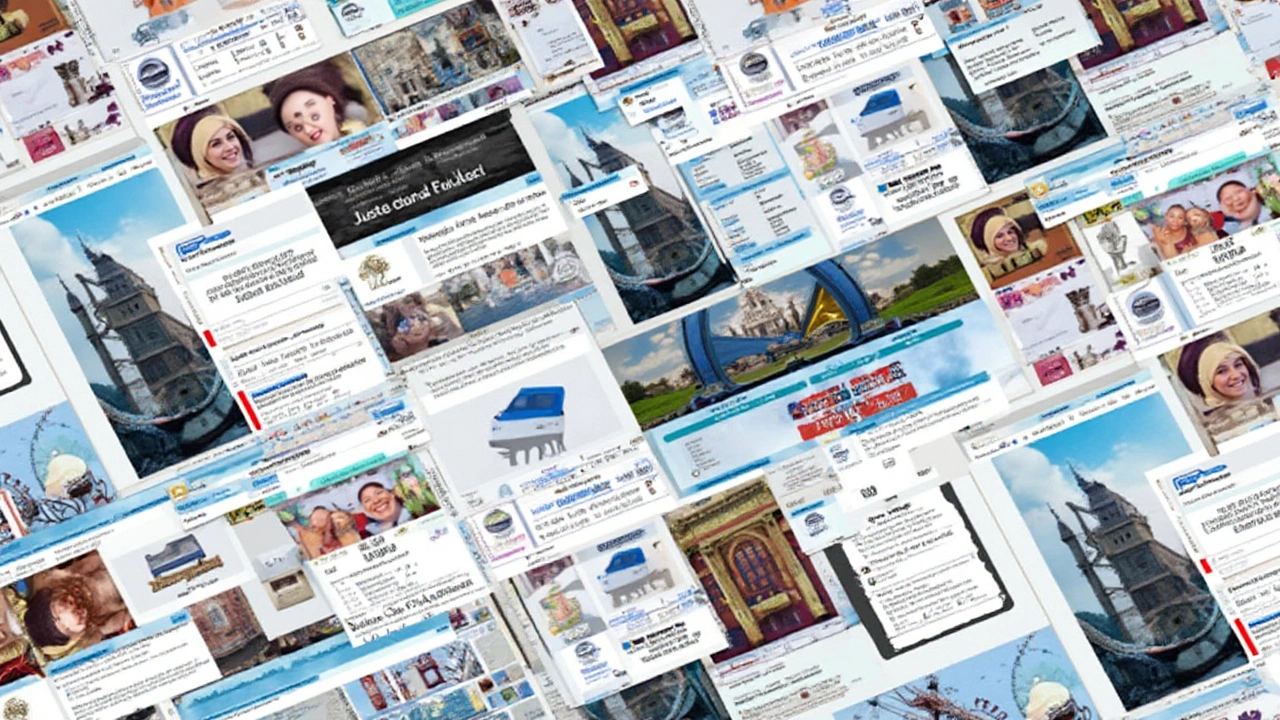In today's digital age, internet marketing has become a lifeline for businesses looking to expand their reach and profitability. From small startups to large corporations, the shift towards online platforms has changed the way companies interact with their audiences, deliver their messages, and achieve their goals.
One significant factor in this transformation is digital advertising strategies. Businesses can target specific demographics and track the effectiveness of their campaigns in real-time, making adjustments as needed to maximize impact.
Another major benefit is the substantial impact on business growth. By utilizing internet marketing, companies can increase their visibility, attract more customers, and build stronger brand loyalty. This isn't just theory; numerous case studies show the substantial returns companies have achieved through well-executed online marketing plans.
Of course, the tools and platforms available today play a crucial role in facilitating these strategies. From social media giants like Facebook and Instagram to search engine optimization (SEO) tools and email marketing software, there's an abundance of resources at a marketer's disposal.
Looking ahead, the future trends in internet marketing are equally promising. Technological advancements, such as AI and machine learning, are expected to further revolutionize the industry, offering even more refined targeting options and personalized customer experiences.
Digital Advertising Strategies
Digital advertising strategies have become essential tools for businesses aiming to capture a wider audience and drive growth in the ever-competitive market. These strategies range from simple banner ads to sophisticated data-driven campaigns that target potential customers with remarkable precision. One of the most popular strategies includes pay-per-click (PPC) advertising. PPC allows businesses to bid for ad placement in search engine sponsored links. For instance, Google Ads is a common PPC platform where you pay a small fee each time one of your ads is clicked. It’s a way of buying visits to your site, rather than earning those visits organically.
Another critical strategy is social media advertising. With platforms like Facebook, Instagram, and LinkedIn providing extensive targeting options, companies can reach specific demographics based on age, location, interests, and behaviors. This tailored approach ensures that the right message gets to the right people, often resulting in higher engagement and conversion rates. Social media ads can come in various forms such as image ads, video ads, carousel ads, and sponsored posts.
Email marketing is also an age-old tactic but continues to be effective when done correctly. Personalized email campaigns can nurture leads, keeping the audience engaged with regular updates and promotions tailored to their interests. By utilizing tools like Mailchimp or Constant Contact, businesses can automate and refine their email strategies to keep potential customers in the loop.
Content marketing is another pillar of digital advertising. High-quality content, which includes blog posts, videos, infographics, and podcasts, can attract and convert visitors. A well-executed content marketing strategy can boost a company's visibility and authority in its industry. A good example of this is HubSpot, a company renowned for its educational blog posts and resources that drive significant traffic to their site.
Programmatic advertising has also risen in popularity. This method uses AI to automate the buying of ads and can target audiences more specifically, making the ad buying process efficient and cost-effective. Typically, it includes real-time bidding, where ads are bought and sold on a per-impression basis. According to eMarketer, programmatic ad spending will account for 86.5% of all digital ad dollars in 2024.
Influencer marketing has become another vital strategy, especially for brands targeting younger demographics. Partnering with influencers—people who have a significant following on social media platforms—allows companies to tap into an engaged audience. An effective influencer marketing campaign can enhance brand trust and reach, often translating to higher sales and customer loyalty.
"Digital marketing is essential for modern brands, not only for boosting conversion rates but also for establishing a solid online presence," says Rand Fishkin, co-founder of Moz.
Retargeting campaigns are also widely used strategies in digital marketing. Retargeting involves showing ads to users who have previously visited your website but did not complete a purchase. Techniques such as pixel-based retargeting and list-based retargeting help to keep potential customers engaged by showing them relevant ads based on their behavior.
Search Engine Optimization (SEO) remains a foundational strategy that complements paid advertising efforts. A well-optimized website helps to ensure that content appears high in organic search results, driving free traffic to a business's website. Effective SEO requires a clear understanding of keyword research, on-page optimization, and backlink building.

Impact on Business Growth
The impact of internet marketing on business growth is nothing short of revolutionary. By leveraging online platforms, companies can reach a global audience, break down geographical barriers, and engage with potential customers like never before. This flexibility opens up an array of opportunities for scaling businesses at unprecedented rates.
One of the most significant advantages of internet marketing is the cost-effectiveness compared to traditional marketing methods. Online advertising allows businesses to set their budgets and better manage how their resources are utilized. With options like pay-per-click (PPC) and social media ads, companies can ensure they are only paying for genuine interest from users.
Take, for example, the success story of Dollar Shave Club. By using clever online marketing campaigns that went viral, this startup disrupted the razor industry and was eventually acquired for a billion dollars. This kind of impact on business growth was unimaginable in the pre-internet era.
Customer engagement is another crucial factor. Through social media, email marketing, and engaging content, businesses can build relationships and foster loyalty among their audience. These methods allow for real-time feedback and interaction, which traditional marketing can't match. It's about creating a dialogue rather than a monologue.
Internet marketing also provides businesses with comprehensive data analytics. Companies can track customer behavior, measure campaign success, and adjust strategies on the fly. This data-driven approach means that marketing efforts are more efficient and impactful. According to a study by Forbes, companies that use data-driven marketing are six times more likely to be profitable year-over-year.
The variety of tools available for internet marketing further boosts business growth. Email marketing platforms help tailor messages to different segments of an audience, ensuring relevancy and maximizing engagement. SEO tools assist businesses in improving their visibility on search engines, driving more organic traffic to their websites. E-commerce platforms like Shopify and WooCommerce enable businesses of all sizes to sell products directly to consumers online.
“The internet has transformed the way we do business and has opened up a wealth of opportunities for entrepreneurs and established businesses alike,” says John Jantsch, a marketing consultant and author of Duct Tape Marketing.
Additionally, social proof through customer reviews and testimonials can significantly impact a business's credibility and trustworthiness. Studies show that 90% of consumers read online reviews before making a purchase decision. This aspect of internet marketing not only helps in acquiring new customers but also aids in retaining existing ones.
Now, combining all the elements of internet marketing creates a powerful engine for business growth. Whether through direct sales, brand awareness, or customer loyalty, the potential for expansion is vast. The most successful companies are those that can adapt quickly, innovate, and effectively utilize these digital tools and strategies to stay ahead in an increasingly competitive marketplace.

Tools and Platforms
When it comes to internet marketing, the variety of tools and platforms available can be both vast and exciting. Knowing how to navigate this landscape is pivotal for any business aiming to succeed online. Some of these tools are geared toward helping you pinpoint your target audience, while others assist in creating engaging and visually appealing content. Let's dive into some of the most popular and effective platforms that marketers swear by.
Amongst the giants in this field are social media platforms such as Facebook, Instagram, and Twitter. These platforms not only allow you to connect with millions of users but also offer sophisticated targeting options to ensure your ads reach the right people. For example, Facebook Ads Manager provides detailed analytics showing how well your campaigns are doing, allowing you to adjust on the fly for optimal results.
Another crucial tool in the arsenal of internet marketing is Google Analytics. This platform offers in-depth insights into user behavior on your website. It helps you understand which pages are performing well, how visitors are finding your site, and what actions they are taking. This data is invaluable for refining your marketing strategies and creating content that resonates with your audience.
“Proper use of analytics can turn a good campaign into a great one,” says digital marketing expert Neil Patel. “It's about understanding what your audience wants and delivering it to them in the most effective way possible.”
On the content creation side, platforms like Canva and Adobe Spark have revolutionized how marketers produce visual content. Canva offers a user-friendly interface that allows anyone to create professional-quality graphics, from social media posts to marketing brochures, while Adobe Spark is excellent for creating compelling videos and animations that draw in your audience.
Email marketing remains a powerful tool for driving engagement and conversions. Services like MailChimp and Constant Contact offer robust features for creating, scheduling, and automating email campaigns. These platforms let you segment your audience for more personalized messaging, which can lead to higher open and click-through rates.
Finally, let’s not overlook the importance of Search Engine Optimization (SEO) tools like Ahrefs and SEMrush. These platforms provide insights into how your website ranks on search engines, helping you identify opportunities for improvement. With features like keyword tracking, backlink analysis, and competitor research, these tools can significantly enhance your online visibility.
Given the rich variety of tools available, it's essential to choose those that best fit your business needs and goals. The right combination of tools can streamline your workflow, enhance your targeting, and amplify your reach, setting the stage for sustainable growth in the digital realm.

Future Trends
As we peer into the future, it's clear that internet marketing is evolving at a dizzying pace, and businesses that stay ahead of these trends will reap the benefits. One of the most talked-about advancements is the integration of AI and machine learning in digital marketing strategies. These technologies are enabling granular personalization, allowing businesses to craft advertising messages that speak directly to individual customer preferences and behaviors.
Another trend gaining traction is the use of voice search. With the ubiquity of smart speakers and digital assistants like Amazon's Alexa and Google Assistant, optimizing content for voice queries is becoming essential. Marketers are focusing on natural language processing and long-tail keywords to ensure their content is discoverable in voice search results. This shift demands creativity and a deep understanding of how people naturally ask questions and seek information.
Augmented reality (AR) and virtual reality (VR) are also set to revolutionize internet marketing. Retailers, for example, use AR to provide virtual try-ons, while real estate companies offer VR tours of properties. These immersive experiences engage customers in ways that static images and text cannot, facilitating more informed purchasing decisions. According to a 2023 survey by Statista, 61% of consumers said they prefer to shop with brands that offer AR experiences.
"Artificial intelligence and machine learning are not just buzzwords; they are reshaping the landscape of digital marketing," says industry expert Neil Patel. "Businesses that leverage these technologies are seeing significant improvements in customer engagement and conversion rates."
Social media continues to be a dynamic space for internet marketing innovation. Platforms like TikTok and Instagram are constantly evolving, offering new features such as shoppable posts, live streaming, and enhanced analytics tools. These updates provide marketers with fresh avenues to connect with their audiences and drive sales. Additionally, the trend of influencer marketing shows no sign of slowing down. Collaborating with influencers, who have built trust and rapport with their followers, helps brands to reach niche markets effectively.
Data privacy and security are increasingly important in the realm of internet marketing. With consumers becoming more aware of how their data is used, businesses must prioritize transparent data practices and comply with regulations like GDPR. This not only builds trust but also ensures that marketing efforts are ethical and sustainable in the long term.
Email marketing remains a powerful tool when done right. The future trends here focus on hyper-personalization and automation. Marketers are using advanced segmentation to deliver highly relevant content to subscribers, increasing open and click-through rates. Tools like AI-driven content suggestions and automated workflows enhance the efficiency of these campaigns.
Lastly, video content is dominating internet marketing strategies. From short-form content on platforms like Reels and TikTok to long-form content on YouTube, videos offer a unique way to engage audiences. Statistics from a HubSpot report indicate that 85% of businesses use video as a marketing tool and 88% of video marketers are satisfied with the ROI of their efforts. Live streaming, interactive videos, and 360-degree videos are some of the innovative formats gaining popularity.
Staying ahead in the world of internet marketing means embracing these emerging trends and continuously adapting strategies. It's an exciting time, and the businesses that innovate will be the ones to watch.





